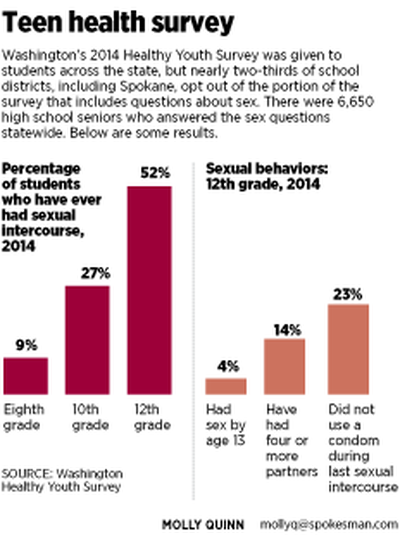Spokane schools, like most, opt out of survey questions about sex

Spokane schools are shying away from asking teens the tough questions about sex.
They are not alone; two-thirds of schools in Washington opted out of a survey that asks if students are having sex and how often.
Mona Griffin, Northeast Educational Service District’s director of prevention, said she’s not surprised that most districts opt out of the questions.
“Sex is one of those issues families want to deal with at home,” Griffin said.
Survey questions about drug use, tobacco, suicide, drinking and violence, on the other hand, have a green light.
Washington’s Healthy Youth Survey is a collaboration of education policymakers and health agencies. The information is used for grants and helps determine where resources need to go.
Results of the 2014 survey were released this month.
The state survey is distributed to school districts every two years, and a few schools are randomly selected to answer the questions. There are two versions. One survey includes sexual behavior questions, which were added in 2010, and another omits them.
At one point, the survey’s designers wanted to create a single survey and not provide an alternate option. Those who use the survey data, however, feared that doing so would greatly limit the number of schools that answered, hence the second survey, said Donn Moyer, Washington Department of Health spokesman.
Spokane Public Schools formed a committee of parents, teachers and administrators to decide which survey students should answer.
“There was too much controversy, and the feeling was too many parents would opt out,” said Wendy Bleecker, the district’s director of student services. “So, we decided not to do it.”
All other districts in Spokane County opt out as well.
“We opt out of the sexual behavior questions because we don’t think it’s appropriate for our students,” said Terrie VanderWegen, Central Valley School District’s assistant superintendent.
Dr. Kim Thorburn, former regional health district officer and Planned Parenthood director, said Spokane Public Schools “leads the way in the community” and was pretty “adamant about not answering.”
Thorburn said it’s a “tragedy” that Spokane County’s youth does not answer those questions.
“It’s a head-in-the-sand kind of approach. Our community seems to think if we ask the question, it will lead to behavior.”
There are five sexual behavior questions on the survey:
• Have you ever had sexual intercourse?
• How old were you when you had sexual intercourse the first time?
• During your life, with whom have you had sex? (Multiple choice answers provided are male, female, both or never have had sexual contact.)
• With how many people have you had sexual intercourse?
• The last time you had sex, did you or your partner use a condom?
Agencies that work on the test include the Department of Health, the Social and Health Service’s Division of Behavioral Health and Recovery, and the Office of the Superintendent of Public Instruction.
“The survey is a great tool to learn what our youth is doing,” said Dr. Joel McCullough, Spokane Regional Health District’s lead medical officer.
The sexual behavior information is important to know because health officials can determine what issues to address, he said.
“Without that data, we are not sure,” he said.
Travis Schulhauser, Spokane Public Schools’ director of assessment and evaluation, said the district has a huge interest in providing support to make its students successful.
“If there’s a way to get them more resources and in order to get them that we need more information, then that’s what we need to do,” he said.
Determining whether students should answer the survey’s sexual behavior questions is “probably something we need to revisit.”